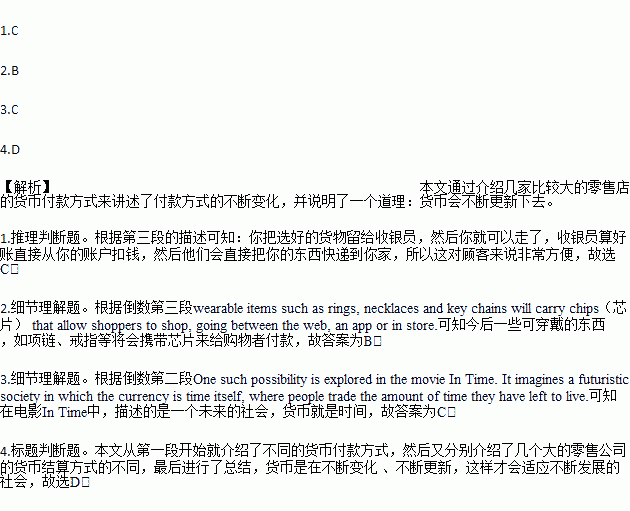题目内容
How do you pay for things in a shop? Perhaps you like the touchable reliability of hard cash? Maybe the financial flexibility of a credit card suits you better? Or perhaps you prefer the simple convenience of a smartphone?
Whatever you use today, experts believe all these methods could soon become outdated. Instead, we will use our bodies: our eyes, our fingerprints, even our mere presence in the store. In fact it's happening already. Amazon are trialing stores which have no checkouts, where technology tracks the items you've taken from the shelves and deducts(扣除) the total from your account when you leave the shop.
French supermarket Monoprix takes a different path: you choose your groceries and leave them with a human cashier. You then leave the shop while the cashier adds up your bill, charges your account, and organizes delivery to your home.
Amir, CEO of Barclaycard predicts that such new developments mean the end of the plastic credit card. Instead, wearable items such as rings, necklaces and key chains will carry chips(芯片) that allow shoppers to shop, going between the web, an app or in store.
And while all the above payment methods are supported by accounts held in traditional currencies, let's not forget the rise of alternatives such as Litecoin. Virtual(虚拟) currencies can rise in value very quickly. One such possibility is explored in the movie In Time. It imagines a futuristic society in which the currency is time itself, where people trade the amount of time they have left to live.
Or perhaps we'd do better to wind back the clock to the simpler financial world of the equal exchange economy. While the term recalls images of bags of grain and herds of sheep being exchanged in ancient times, there are signs that are making a comeback in today's world of modern technology. Maybe the only thing we know for certain is that money will keep updating.
1.Which of the following statements is TRUE?
A. Payment is done by the cashiers at Amazon.
B. All the methods of payment have become outdated.
C. Shopping at Monoprix is convenient for customers.
D. Customers can leave their credit cards at Monoprix.
2.What might replace the credit cards in the future according to Amir?
A. Smartphones. B. Wearable items.
C. Virtual currencies. D. Fingerprints.
3.What is used as a currency in the movie In Time?
A. Litecoin. B. Human life.
C. Time. D. Bags of grain.
4.Which is the best title for the passage?
A. The Rise of Virtual Currencies. B. The History of Money.
C. The Ending if Credit Cards. D. The Changing Nature of Money.


 eir native languages.
eir native languages.